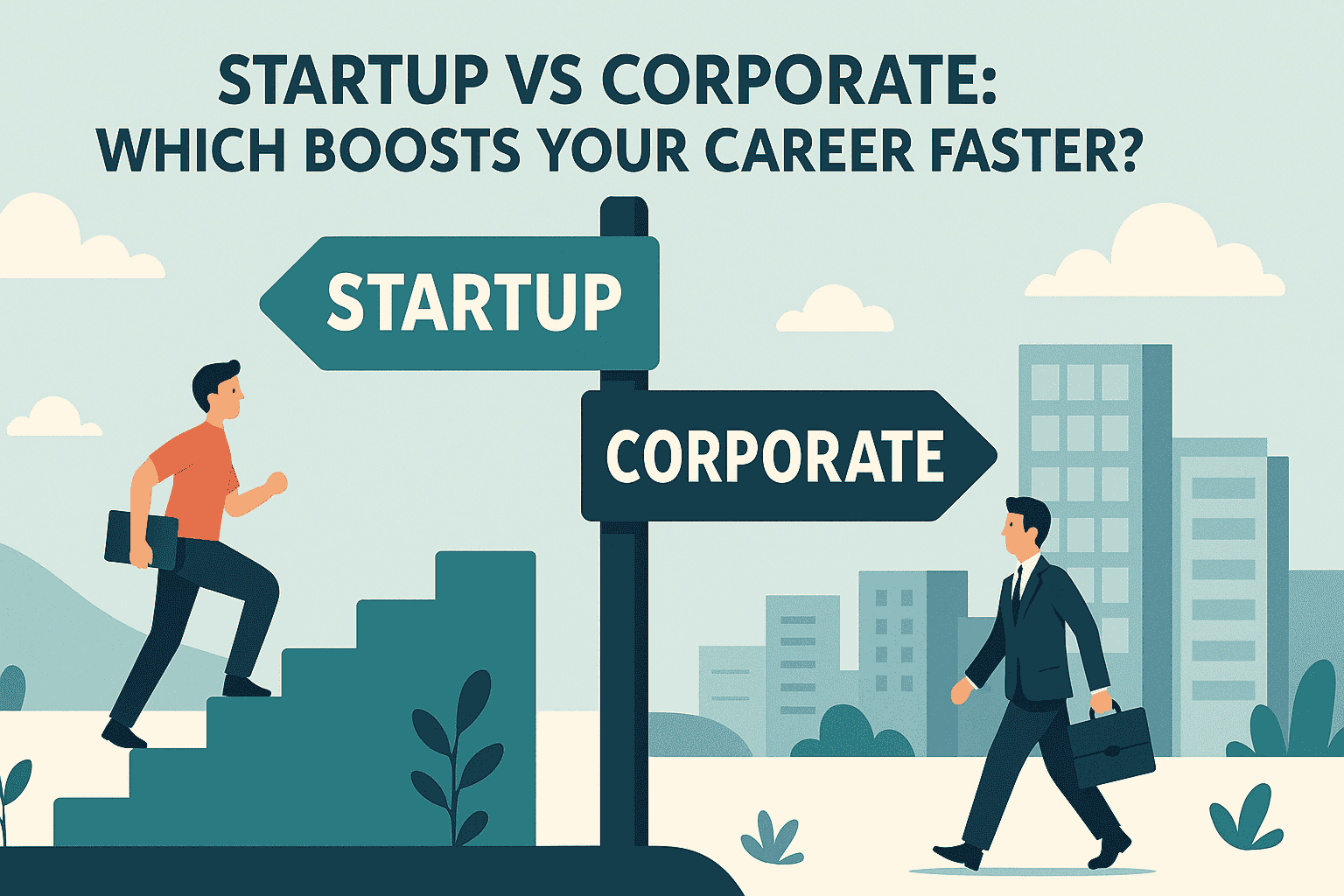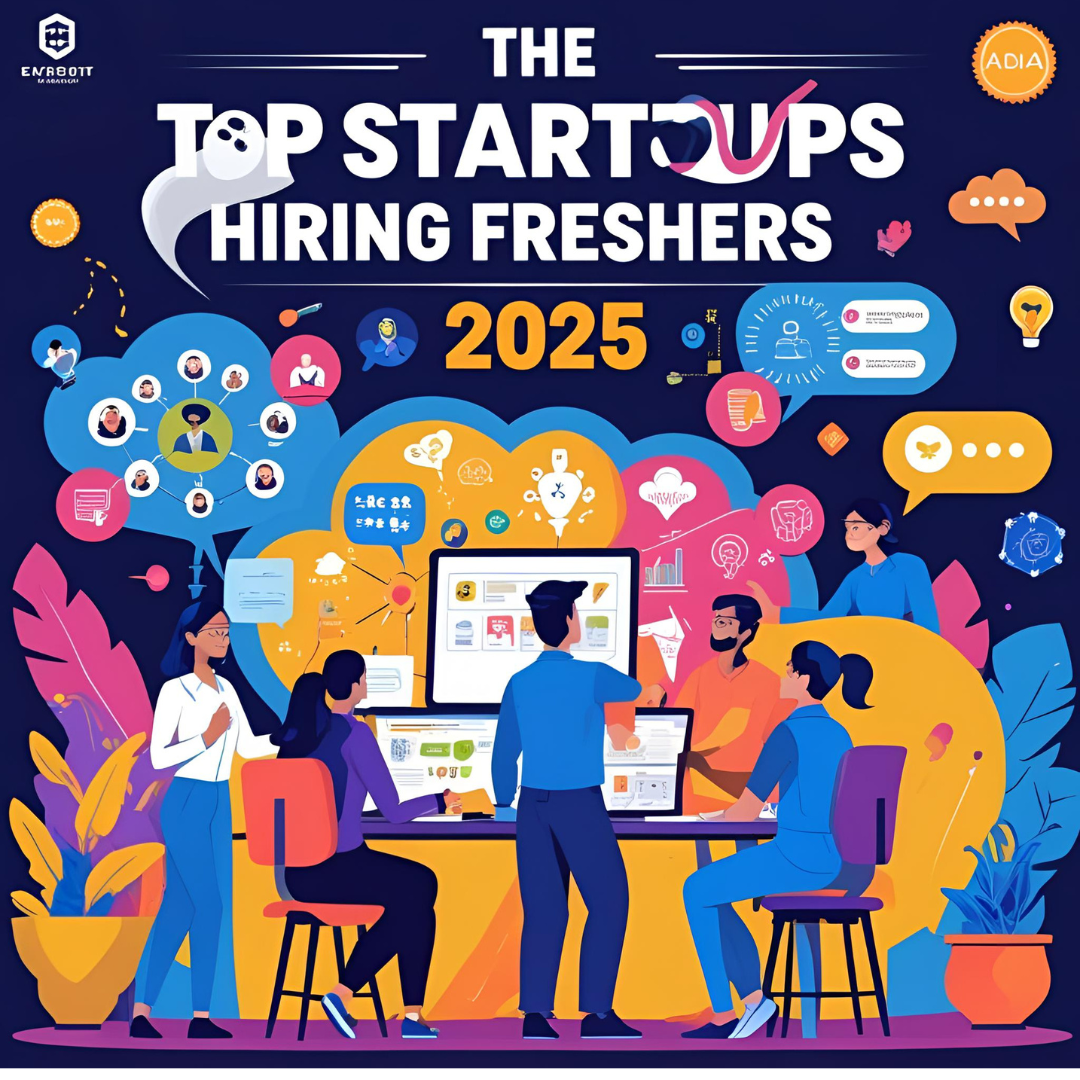
Startup or Corporate in 2025? Choose the Right Path for Your Career
Corporate vs Startup Work: What's Right for You in 2025?
With work life evolving at a record rate in 2025, new grad working professionals and career transitioners have one decision-making question on the back of their minds: Do I work at a corporate or start up? With the job setting being revolutionized by technology and values shifting towards impact, flexibility, and growth, locating the right workplace is more important than ever.
This piece dives deep into the differences, pros and cons, and optimal personality match for corporate and startup career avenues so that you are able to make a well-informed career decision in 2025.
1. Getting Acquainted with the Scene: Corporate vs. Startup
Corporate Careers are corporate careers at large, established companies with formal structures, tightly defined roles, and venerable rituals. Consider Google, Tata, Infosys, Accenture, or any high-scale MNC, for instance.
Startup Careers are in young-to mid-age companies, most often set up in the last 5-10 years. They are still refining products, finding market fit, or scaling rapidly—fintech apps, edtech platforms, D2C brands, or AI-powered SaaS startups.
2. Growth Opportunities: How's the Career Trajectory?
Corporate: Formal but Slow-Paced
•typically have well-laid-out promotion cycles, appraisal systems, and career paths.
•training programs exist, but progression is due to tenure and politics.
• Super for individuals who enjoy stability and incremental progress.
Startup: Fast but Potentially Explosive
• Must shoot two levels in one year—or flame out too soon.
• Learning by doing, no spoon-feeding.
• High achievers might be CXOs or team leads in 2–3 years if the startup takes off.
Verdict: If you're ambitious and flexible and want to accelerate your career, startups offer unmatched speed. But if gradual growth with buffers is your strength, corporates are the destination.
3. Job Security: Is My Job Safe?
Corporate: High Stability
• Corporates have better fiscal buffers, diversified business groups, and staff benefit schemes.
• There are layoffs definitely, but never suddenly.
Startup: Volatile
•Startups are more likely to experience meltdowns in the market, lack of funding, or product failure.
•6 months' layoff is not rare if the runway is exhausted.
Verdict: Corporates hands down win on long-term job security.
4. Work Culture & Lifestyle: Which One Suits You?
Corporate: Professional & Hierarchical
•Professional working times (primarily 9–6), professional dress, and structured chains of command.
•Clear definition of team boundaries and roles.
•Better work-life balance, but not so much in tech or consulting.
Startup: Flexible but Demanding
•Flexible hours, but with sky-high levels of stress.
•Everyone does everything—a hypothetical project has an intern pitching to a client or charting a product path.
•No bureaucracy equates to more ownership and more chaos.
Verdict: Choose corporate if you like structure; choose a startup if you love hustle and nuance.
5. Salary and Perks: Who Pays More?
Corporate: Fixed Salary, Great Benefits
• Fixed salary CTC, health insurance, PF, bonuses, and stock options (in MNCs).
• Salary hikes are low but frequent.
Startup: Less Fixed Compensation, More Hope
• Less fixed salary but more equity (share-holding) in startup companies.
• Perks can be flexible working hours, work-from-home, free meals, or counselling for mental wellness.
• Early joiners have a chance to become millionaires in the case of an acquisition or public listing through IPO.
Verdict: Corporates provide you with good money; startups are long-term value bets.
6. Skill Development: What Will You Learn?
Corporate: Specialization
•You develop expertise in your field in your career (e.g., finance analyst, HR manager).
•Mastering soft skills like stakeholder management, presentation, and compliance.
Startup: Generalization + Innovation
•You acquire cross-functional abilities: coding + marketing + operations.
•Startups foster creativity, problem-solving, and grit in uncertain situations.
Verdict: Startups suitable for experience learners and would-be entrepreneurs; corporates suitable for in-depth sector insight.
7. Social Image and Prestige: What Others Will Think?
Corporate: Brand Name
• Landing a job at TCS or Deloitte generally lends prestige to your resume.
• Useful in building credibility with clients, family members, and future employers.
Startup: Still Misunderstood
• Most people still consider startup work to be "unstable" or "temporary."
• At the same time, working for a trendy startup (e.g., AI or EV) will get you more reputation within niche communities.
Verdict: Corporates win at legacy; startups win at trendiness.
8. Who Should Pick What?
|
Category |
Corporate |
Startup |
|
Risk tolerance |
Low to moderate |
High |
|
Career goal |
Stable, long-term growth |
Fast-track to leadership or entrepreneurship |
|
Work preference |
Structured roles, predictable schedule |
Dynamic roles, flexible hours |
|
Personality |
Process-driven, team-oriented |
Independent, innovative, experimental |
|
Financial situation |
Needs stable income |
Can take income variability |
9. 2025 Trends to Watch Before Making Up Your Mind
•Remote-first startups are gaining traction, providing global visibility even to small teams.
•Corporate digital transformation sees MNCs getting more agile and startup-like.
•AI and automation are transforming work in industry—learning to be a chameleon is what's required.
•Green-tech, health-tech, and AI companies are competing for talent and investment in 2025.
•Job loyalty is on the decline; even corporate fat cats change jobs more quickly than ever.
10. Last Thoughts: Choose Based on YOU
There is no right or wrong—only a right fit.
Ask yourself:
• Do I want to give it a go and play around, or build deep specialism?
• Do I prefer living in uncertainty or do I prefer predictability?
• Do I get rewarded by long-term vision or short-term success?
Your financial goals, learning, risk tolerance, and personality should dictate your choice—not friends' pressure or LinkedIn rumors.
And keep in mind that all good things must come to an end. Most professionals swing between startups to corporate and vice versa at some point. Your first career is just the beginning and not the end.
FAQs
Q1. Which is better for freshers in 2025 – corporate or startup?
For freshers, startups offer hands-on learning, exposure across roles, and faster growth. However, corporates provide structured training, brand credibility, and job stability. Choose based on your risk appetite and learning preference.
Q2. Can I switch from a startup to a corporate job later?
Yes, many professionals successfully transition from startups to corporates. Highlight your multitasking ability, innovation, and agility during interviews. However, make sure to document your contributions clearly, as roles in startups are often less defined.
Q3. Do startups really pay less than corporate jobs?
Startups may offer lower fixed salaries initially, but they often provide performance bonuses, ESOPs (stock options), or growth-linked incentives. In contrast, corporates give more predictable pay and benefits. The overall payoff depends on the startup's success and your role in it.



